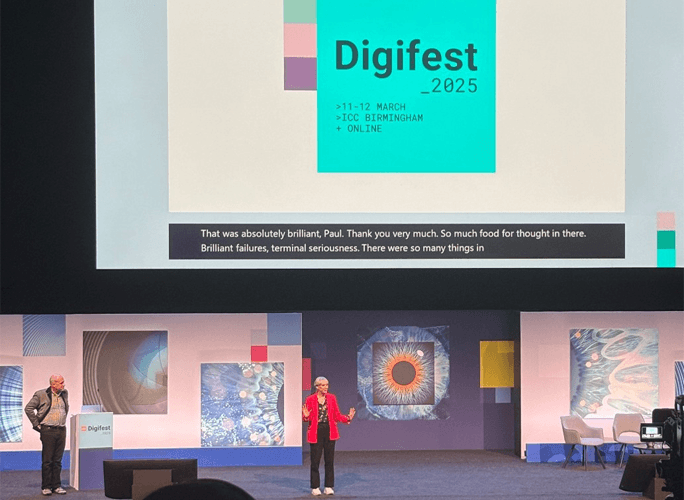Digifest 2025: Key Takeaways and Next Steps
Posted on: 2 April 2025 by Kat Purdy in Conference & Event Reports

Attending Digifest 2025 was a great chance to think about how digital innovation is shaping education. With universities facing financial challenges and changing international student numbers, I was reminded that digital experiences aren’t just a nice-to-have, they’re essential.
This year’s discussions focused on three key areas: improving digital support for international students, the role of AI in assessment, and making sure staff have the digital skills they need. Below, I share my thoughts on these topics, along with useful ideas and next steps for universities adapting to these changes.

Rethinking Digital Support for International Students
One of the most thought-provoking sessions focused on the need to create more inclusive digital experiences for international students. Speakers from the University of Leeds and the University of Nottingham shared research on digital culture shock, highlighting how students arriving from different educational systems often face barriers navigating UK university platforms, accessing essential services, or engaging with digital learning in ways institutions might take for granted.
I hadn’t fully considered how some students struggle due to restrictive internet policies in their home countries, while others encounter digital literacy gaps that impact their ability to fully participate in online learning. The key takeaway? Universities need to go beyond just offering digital tools, they need to make sure students can actually use them effectively.
What Universities Can Do:
- Pre-arrival digital orientation: Providing multilingual guides and onboarding sessions covering virtual learning environments (e.g. Canvas, MS Teams) and cybersecurity awareness.
- Dedicated digital support teams: Peer mentoring schemes and tailored IT support can help international students navigate digital systems from day one.
- Jisc Digital Insights Survey: Using student feedback to inform targeted improvements to the international students’ digital experience (PDF).
- Improving accessibility and inclusivity: Ensuring platforms are mobile-friendly, integrating closed captions and translation tools, and offering flexible online learning options.
Best Practice: University of Leeds’ “You Said, We Did” Model
The University of Leeds’ International Student Success Group stood out to me as a fantastic example of how universities can take a student-led approach to improving digital experiences. Their model ensures that international students’ feedback directly informs policy and practice, leading to tangible improvements in support structures and retention rates.
The Role of AI in Assessment and Learning
AI’s increasing presence in education continues to challenge traditional assessment models. A panel featuring experts from Edge Hill University, Nottingham College, and Buckinghamshire New University explored how institutions can move beyond a fear-based approach to AI and instead develop policies that integrate AI literacy into teaching and learning.
One question that really resonated with me was: if spellcheckers and calculators are now widely accepted, should AI tools be treated any differently? Rather than resisting change, institutions need clear frameworks that guide students and educators in responsible AI use.
Best Practice: Nottingham College’s “Gen.AI Usage Scale”
One practical approach I found particularly useful was Nottingham College’s AI Assessment Scale, which categorises different levels of AI use in assessments, from simple paraphrasing to advanced data analysis. This model helps educators and students understand when and how AI can be used appropriately in academic work. You can explore this framework in more detail here with the Generative AI Usage Scale (PDF).

Digital Skills in Teacher Training
Another key takeaway for me was the ongoing assumption that educators already possess the digital skills needed to integrate technology effectively into their teaching. A session led by South Gloucestershire and Stroud College and the University of Oxford challenged this, advocating for a structured, institution-wide approach to digital upskilling.
I’ve seen first-hand how digital training for staff can be inconsistent, often framed as an IT issue rather than a pedagogical priority. To address this gap, institutions need to embed digital skills training into CPD programmes, ensuring staff feel confident integrating technology into their teaching.
Best Practice: University of Oxford’s Flexible Digital Upskilling Model
The University of Oxford’s approach really stood out to me. By combining structured CPD, onboarding, and peer learning, they offer training in multiple formats, allowing staff to engage with digital learning at their own pace. This flexibility leads to higher adoption rates and improved digital confidence across the institution.
Next Steps: Embracing Digital Innovation as a Strategic Priority
As financial pressures continue to reshape higher education, institutions that prioritise digital inclusion and innovation will be best positioned to attract and retain students. Based on what I learned at Digifest 2025, here are five key actions universities should take:
- Make digital support part of international student recruitment – Provide better digital onboarding and tailored support from the start.
- Develop AI literacy policies – Give students and staff clear guidance on how to use AI responsibly.
- Rethink assessment models – Explore AI-assisted assessments that reflect real-world skills.
- Support staff digital upskilling – Make digital skills training part of professional development, not an afterthought.
- Use student feedback to improve digital services – Tools like the Jisc Digital Insights Survey can help universities make meaningful changes.
Reflecting on Digifest 2025, it’s clear that digital innovation isn’t just about technology, it’s about people. Universities that prioritise digital inclusion and accessibility will be the ones that thrive in an increasingly competitive higher education sector.
Further Reading
- Jisc’s HE Generative AI Literacy Definition
- Jisc’s AI Literacy Training Series
- Jisc’s Research on International Students' Digital Experiences
Keywords: Digital Skills, Education, Conference, International Students, AI, Inclusivity, Digital Experience, Assessment, Policies, AI Literacy.